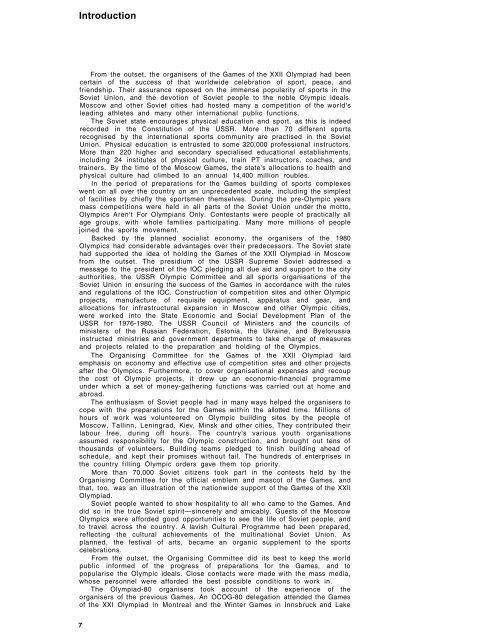or1980v2pt1
or1980v2pt1
or1980v2pt1
You also want an ePaper? Increase the reach of your titles
YUMPU automatically turns print PDFs into web optimized ePapers that Google loves.
Introduction<br />
From the outset, the organisers of the Games of the XXII Olympiad had been<br />
certain of the success of that worldwide celebration of sport, peace, and<br />
friendship. Their assurance reposed on the immense popularity of sports in the<br />
Soviet Union, and the devotion of Soviet people to the noble Olympic ideals.<br />
Moscow and other Soviet cities had hosted many a competition of the world's<br />
leading athletes and many other international public functions.<br />
The Soviet state encourages physical education and sport, as this is indeed<br />
recorded in the Constitution of the USSR. More than 70 different sports<br />
recognised by the international sports community are practised in the Soviet<br />
Union. Physical education is entrusted to some 320,000 professional instructors.<br />
More than 220 higher and secondary specialised educational establishments,<br />
including 24 institutes of physical culture, train PT instructors, coaches, and<br />
trainers. By the time of the Moscow Games, the state's allocations to health and<br />
physical culture had climbed to an annual 14,400 million roubles.<br />
In the period of preparations for the Games building of sports complexes<br />
went on all over the country on an unprecedented scale, including the simplest<br />
of facilities by chiefly the sportsmen themselves. During the pre-Olympic years<br />
mass competitions were held in all parts of the Soviet Union under the motto,<br />
Olympics Aren't For Olympians Only. Contestants were people of practically all<br />
age groups, with whole families participating. Many more millions of people<br />
joined the sports movement.<br />
Backed by the planned socialist economy, the organisers of the 1980<br />
Olympics had considerable advantages over their predecessors. The Soviet state<br />
had supported the idea of holding the Games of the XXII Olympiad in Moscow<br />
from the outset. The presidium of the USSR Supreme Soviet addressed a<br />
message to the president of the IOC pledging all due aid and support to the city<br />
authorities, the USSR Olympic Committee and all sports organisations of the<br />
Soviet Union in ensuring the success of the Games in accordance with the rules<br />
and regulations of the IOC. Construction of competition sites and other Olympic<br />
projects, manufacture of requisite equipment, apparatus and gear, and<br />
allocations for infrastructural expansion in Moscow and other Olympic cities,<br />
were worked into the State Economic and Social Development Plan of the<br />
USSR for 1976-1980. The USSR Council of Ministers and the councils of<br />
ministers of the Russian Federation, Estonia, the Ukraine, and Byelorussia<br />
instructed ministries and government departments to take charge of measures<br />
and projects related to the preparation and holding of the Olympics.<br />
The Organising Committee for the Games of the XXII Olympiad laid<br />
emphasis on economy and effective use of competition sites and other projects<br />
after the Olympics. Furthermore, to cover organisational expenses and recoup<br />
the cost of Olympic projects, it drew up an economic-financial programme<br />
under which a set of money-gathering functions was carried out at home and<br />
abroad.<br />
The enthusiasm of Soviet people had in many ways helped the organisers to<br />
cope with the preparations for the Games within the allotted time. Millions of<br />
hours of work was volunteered on Olympic building sites by the people of<br />
Moscow, Tallinn, Leningrad, Kiev, Minsk and other cities. They contributed their<br />
labour free, during off hours. The country's various youth organisations<br />
assumed responsibility for the Olympic construction, and brought out tens of<br />
thousands of volunteers. Building teams pledged to finish building ahead of<br />
schedule, and kept their promises without fail. The hundreds of enterprises in<br />
the country filling Olympic orders gave them top priority.<br />
More than 70,000 Soviet citizens took part in the contests held by the<br />
Organising Committee for the official emblem and mascot of the Games, and<br />
that, too, was an illustration of the nationwide support of the Games of the XXII<br />
Olympiad.<br />
Soviet people wanted to show hospitality to all who came to the Games. And<br />
did so in the true Soviet spirit—sincerely and amicably. Guests of the Moscow<br />
Olympics were afforded good opportunities to see the life of Soviet people, and<br />
to travel across the country. A lavish Cultural Programme had been prepared,<br />
reflecting the cultural achievements of the multinational Soviet Union. As<br />
planned, the festival of arts, became an organic supplement to the sports<br />
celebrations.<br />
From the outset, the Organising Committee did its best to keep the world<br />
public informed of the progress of preparations for the Games, and to<br />
popularise the Olympic ideals. Close contacts were made with the mass media,<br />
whose personnel were afforded the best possible conditions to work in.<br />
The Olympiad-80 organisers took account of the experience of the<br />
organisers of the previous Games. An OCOG-80 delegation attended the Games<br />
of the XXI Olympiad in Montreal and the Winter Games in Innsbruck and Lake<br />
7


